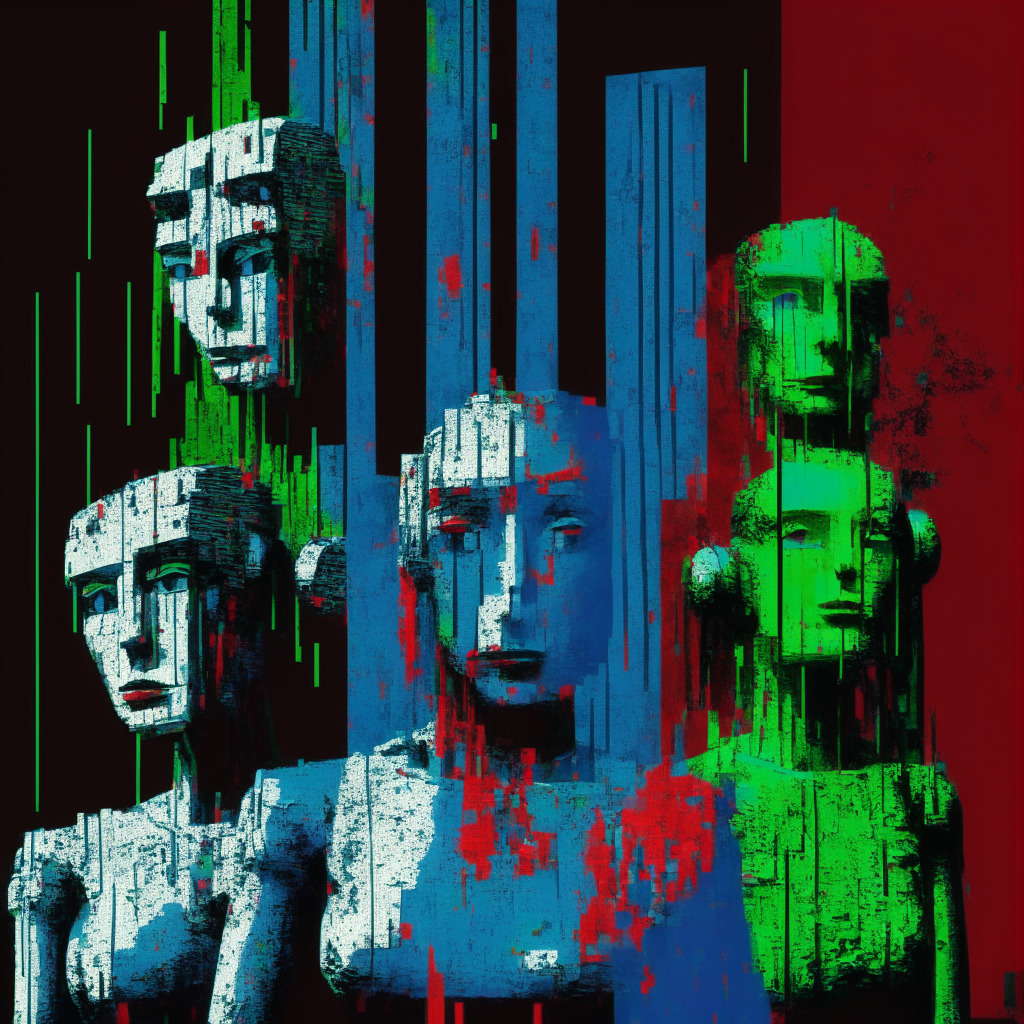“Embracing self-sovereignty demands a shift to blockchain and cryptographic technologies. Contrary to centralized systems, decentralization offers individual control of one’s data, identities, and credentials. Web3 technologies promise individuals security for their data. However, achieving self-sovereign data requires extensive real-world infrastructure and new coding paradigms.”
Category: Technology
Harnessing Blockchain: Climate Change Ally or Adversary?
“Energy Web CEO, Jesse Morris, highlighted potential of blockchain technology in combating climate change in a recent podcast. He targeted revision of economics of climate change, proposing two major actions – electrification of everything and efficient electricity system management using technological networks, thus eliminating the need for fossil fuels.”
NFTs on the Menu: Revolutionizing Trackability in the Food Industry
“As the world becomes more digitalized, the food and beverage industry is embracing Nonfungible tokens (NFTs), with the potential global market reaching USD 2,134.04 million by 2032. These blockchain-verified digital entities provide transparency, traceability, and engagement for consumers, but face challenges such as limited awareness and technical complexities.”
Crypto Casinos: Revitalizing a Volatile Market or Simply a High-Stakes Gamble?
The Ethereum blockchain-hosted crypto casino Coco saw a surge in transaction volume, hitting $36 million within its first 12 hours. Its token, COCO, reached 8 cents, solidifying a market cap of $8.8 million, making it something of a trendsetter in the current slow crypto market. Coco’s transparency and “provably fair” games, alongside traditional casino games and slots have garnered attention and attracted users looking for excitement in the cryptosphere.
Simulation Theory – Reality Unraveled or Futuristic Illusion?
“This theory, known as simulation theory, posits that our reality, with all its intricacies and grandeur, might be nothing more than a complex computer simulation. The narrative that humans could be living in an uncannily realistic virtual realm is not new.”
Hydropowered Crypto Mining in Kyrgyzstan: Balancing Innovation and Sustainability
Kyrgyzstan’s President, Sadyr Japarov, approved the construction of a $20 million cryptocurrency mining farm at a hydroelectric power plant to curb energy losses from non-utilized power. The project, intending to repurpose wasted energy, has raised environmental and regulatory concerns, leaving the future of blockchain in Kyrgyzstan delicately poised between innovation and sustainability.
Surging Success and Evolving Concerns: Vera Molnár’s Journey into NFT Artistry
Artist Vera Molnár and Martin Grasser released a collection of 500 non-fungible tokens (NFTs) named ‘Themes and Variations’, selling out in under an hour and earning over $1.1M. Despite the exciting prospects of NFTs, the volatility of the crypto market and environmental concerns should be considered.
From Memecoin to Contender: The Remarkable Evolution of SHIB and the Launch of Shibarium
“SHIB, once a memecoin, is becoming a substantial blockchain contender with the launch of Shibarium, a layer 2 network. Shibarium promises potential price jumps for its tokens due to increased demand. It aims to solve scaling and data challenges by consolidating transactions, thereby reducing fees.”
Elon Musk’s X vs Threads: The Battle for Social Media Dominance and User Loyalty
“Musk’s vision for platform X includes becoming the “source of truth on the Internet” through a global expansion of Community Notes. However, balancing innovation and user expectations proves delicate; rapid growth doesn’t guarantee sustained traction or loyal followers. The ultimate victor in text-based social media supremacy remains undecided.”
Customizable NFT-Styled Debit Cards: Pushing the Boundaries of Personalized Banking or Risky Endeavour?
“Animoca Brands is partnering with hi, a Web3 app, for the launch of customizable NFT-styled crypto debit cards. The move is set to revolutionize personal finance and digital banking, emphasizing individual expression within the Web3 space and advancing the utility of non-fungible tokens. The launch, however, does pose potential security issues due to its reliance on a dual-node structure.”
Unlocking the Pandora’s Box: AI Models Vulnerable to Harmful Content Generation
AI researchers have discovered an automated method to manipulate AI chatbots like Bard and ChatGPT into generating harmful content. By extending prompts with long suffixes, they can circumvent safety measures designed to prevent the spread of hate speech and disinformation. This raises concerns over misuse and calls for robust protections against such adversarial attacks.
The Intriguing Prologue of Central Bank Digital Currencies: Boon or Bane?
Central banks worldwide are exploring Central Bank Digital Currencies (CBDCs): digital versions of their currency eliminating intermediaries. This development claims cost-saving potential and policy-making tools but carries risks. Without private banking, government surveillance increases, the market economy may stagnate, and individual protections decrease. Politically-motivated fund allocation also becomes possible. Therefore, while CBDCs may appear attractive, comprehensive discussions around the dangers and ethical use are needed.
Unlocking the Future: Optimism’s Beam Wallet Redefines Crypto Transactions
“Step into the future with blockchain-based Beam wallet. This innovative application uses Twitter for login, eliminating the need to store seed words. Backed by top Web3 venture capitals, it aims to enhance user experience, increase adoption rate and ensure security by not landing passwords on a centralized server.”
The Blockchain Dance-Off: Optimism Outperforms Arbitrum in Transaction Volume Reversal
Optimism, a Layer-2 solution for Ethereum utilizing optimistic rollup technology, has surpassed its rival Arbitrum in terms of transaction volume for the first time in six months. This was largely driven by the launch of Worldcoin on Optimism and a reduction in transaction fees due to Optimism’s Bedrock upgrade. However, Optimism still trails Arbitrum considering the total value locked within contracts.
The Worldcoin Enigma: A Revolution in Identity Protocol or a Privacy Nightmare?
Worldcoin, an innovative platform created by Sam Altman, promises to make cryptographic currencies more dispersed than Bitcoin. Boasting a unique identity protocol using iris scans and AI, it aims to onboard billions of users into crypto markets. However, concerns about privacy, tokenomics, and regulatory challenges have arisen, prompting questions about the future of such revolutionary blockchain projects.
Crypto Competition Uptick: Web3 Wallet Suku vs Twitter’s Vision for Crypto Payments Integration
Web3 wallet Suku is integrating with Twitter to allow users to easily send digital currencies and non-fungible tokens (NFTs). It aims to simplify the crypto onboarding process, bypassing the need to connect a wallet. Furthermore, Suku plans to integrate with other social media platforms, striving to create a decentralized payment system that works across various platforms. Despite the challenges, crypto payments on social media are on a promising trajectory.
Shaping the Future of Renewable Energy: The Unforeseen Role of Bitcoin Mining
“Bitcoin mining appears as an unexpected solution to the ‘duck curve’ – mismatch of peak energy demand and production times. By absorbing excess energy during high production periods, Bitcoin miners help balance grid management, enhancing profitability of renewable infrastructure and contributing to a sustainable future.”
Revolutionizing Crypto Investments: An In-Depth Look at Launchpad XYZ’s AI-Powered Platform
“Launchpad XYZ, leveraging AI-powered price prediction tool, aspires to ease high-value crypto investments by providing data, insights, and analysis. Its native coin $LPX is for availing premium features and covering transaction fees. It introduces NFT mint whitelisting, facilitating users access to new collections backed with critical metrics.”
Optimism Surpasses Arbitrum in Daily Transactions: The Tale of Two Blockchains
“Blockchain layer-2 Optimism surpassed Arbitrum in daily transactions, largely thanks to the emergence of Worldcoin. Despite Optimism’s transaction rates, it trails in daily active wallets compared to Arbitrum. The competition between these two demonstrates the evolving nature and diverse directions of blockchain technology.”
The Thrills and Spills of Home Crypto Mining: Endurance Amid Industry Giants
The world of crypto mining has evolved into a dominion of large-scale mining and finance behemoths, making individual mining increasingly doubtful due to high electricity and equipment costs. Despite these challenges, diehard enthusiasts continue to innovate solutions, believing in the potential of the crypto market.
Bruce Lee Makes a Virtual Comeback: Celebrating Legacy or Crossing Ethical Boundaries?
“Martial arts legend Bruce Lee is set to impart training in the metaverse, offering the opportunity to interact with Lee’s digital avatar, minted on the Ethereum and Polygon blockchains. This concept promotes the application of digital personalities in a virtual world, highlighting an exciting blend of past, present, and future. It also brings up ethical questions about digital representation of deceased individuals.”
Palm Foundation’s Move to Polygon Supernet: Innovations in NFT Infrastructure and the Path Ahead
Palm Foundation, with support from Polygon Labs and Consensys, is developing a Polygon Zero Knowledge Supernet to simplify onboarding and expand its NFT infrastructure. The plan includes addressing governance through Decentralized Autonomous Organizations and enhancing transaction speed while maintaining low gas fees. The initiative, targeting broader Web3 user-base, will complete its migration to a ZK Supernet by 2024.
Resilience of Smart Contracts Amidst Crypto’s Q2 Downturn: An Analysis of Trends and Concerns
Despite reduced investments and crypto market price dips in Q2 2023, the resilience of smart contracts in the blockchain ecosystem has been noticeable, with platforms like Ethereum and BNB Chain documenting a rise in validated smart contracts. This uptick signifies escalating value placed on security, reliability, and scalability within the blockchain ecosystem.
Learning SQL with AI: The Promise and Pitfalls of Using ChatGPT for Tech Education
“ChatGPT, an innovative AI tool, functions as a digital companion guiding users in their SQL learning journey. It prompts interaction, provides insights into data types, tables, and relationships essential in SQL, and even offers assistance in debugging SQL errors.”
UK’s Electronic Trade Documents Act 2023: A Blockchain Revolution in Trade Documentation
“The Electronic Trade Documents Act 2023, passed in the UK, enables the digital storage and distribution of trade documents, potentially leveraging blockchain technology. This could enhance security, compliance, and record traceability, and improve workflow efficiency, while considering reliability and security challenges.”
Navigating the Splendid Yet Dicey Intersection of Metaverse, NFTs and Web3 Finance
“Animoca Brands has invested $30 million into a Web3 payments application called ‘hi’, which aims to enable non-fungible token functionality within a broader Web3 ecosystem. This strategic alliance, seeks to expand into global markets, raises questions about regulation, privacy, and accessibility.”
Exploring the AI Revolution: Netflix’s High-Paying Jobs and Hollywood’s Terror, Twitters Rebranding Controversy
Netflix is seeking AI developers for high-paying roles within its R&D Labs and Machine Learning division. The move comes amid widespread attention to artificial intelligence’s potential impact on the workforce. Meanwhile, Netflix emphasizes practical skills over traditional qualifications.
Exploring Reddit’s Retro Reimagined: A Dive into the Thrilling World of NFT Avatars
Reddit has launched its largest non-fungible token (NFT) collection, the Gen 4 Collectible Avatar series. This includes unique Avatars created by 100 artists and featuring reinterpretations of the famous Snoo character. This NFT marketplace incorporates initial access and purchasing limits to protect against unethical activities and bots.
Twitter Transforms to X: Exploring the Evolution, Challenges, and Future of Digital Communication
“Elon Musk’s rebranding of Twitter to ‘X’ aims to transform the platform into an all-encompassing financial hub. The change has sparked debate amongst users and could potentially trigger significant legal implications due to existing ‘x’ trademarks.”
Twitter Handle Takeover Dispute & The Fight for U.S. Crypto Legislation Clarity
“In a recent turn of events, Twitter handle @X was reportedly confiscated and offered to the user as merchandise and a visit to the company after Elon Musk announced a rebranding under the banner ‘X’. Meanwhile, Coinbase CEO has implored US citizens to cast a ‘yes’ vote for the FIT21 Act, fostering innovation and providing regulatory clarity for crypto firms.”
Unleashing AI on Blockchain: The Future of Crypto Trading or Another Bubble in Disguise?
The intersection of blockchain and AI is evolving as crypto exchanges innovate. Bitget, a cryptocurrency exchange, launched AI trading bots to improve trading experiences. These AI bots aim to offer intuitive trading by focusing on MACD and Boll indicator strategies and providing options for stop profit and stop loss to safeguard user interests.
Journey into the Metaverse: Meta’s High-Stakes Gamble on a Future Forward Approach
In 2022, Meta reported a loss of $13.7 billion for its Facebook Reality Labs division, the team leading metaverse development. Despite financial challenges, Meta anticipates a brighter future, citing key initiatives such as augmented reality, neural interfaces and social platforms.






























